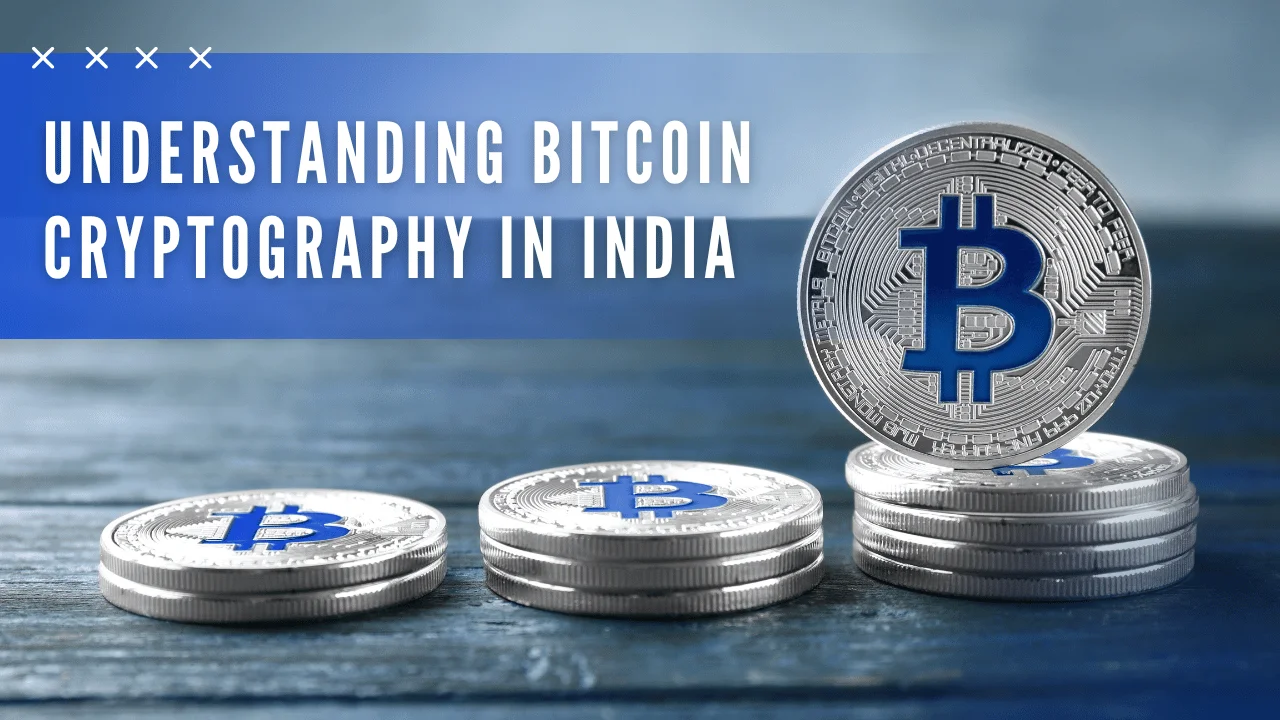With Bitcoin at the forefront of digital currency, a new age of secure, private, and efficient financial transactions has begun. Bitcoin is at the forefront of this digital asset revolution in India, where interest in cryptocurrencies is skyrocketing. Understanding Bitcoin cryptography in India is essential for grasping the intricacies of this innovative financial system. It’s a complex field, but this article will endeavor to simplify it by explaining its basic ideas, how it works, and what it means for the country’s digital economy as a whole.
Cryptographic Principles Behind Bitcoin

Blockchain Technology Applications in India
Decentralized ledgers that record all transactions across a network of computers are known as blockchains, and they are the backbone of Bitcoin. By making every transaction transparent and immutable, this technology makes it very difficult to change past data without the network’s approval. With its increased transparency and efficiency, blockchain technology is finding many uses in India, not only in financial transactions but also in governance, healthcare, and supply chain management.
Bitcoin Transaction Security Mechanisms
Bitcoin relies heavily on cryptographic techniques, such as private keys and digital signatures, to ensure its security. By limiting transaction initiation to the wallet owner alone, these safeguards make sure that all transactions are safe. These safety measures provide an extra degree of protection that conventional banking systems in India lack, which is especially helpful given the prevalence of online fraud and illegal financial transactions in the country.
Digital Currency Adoption in India
Digital currencies, particularly Bitcoin, are gaining popularity in India. One reason for this uptick is the convenience and safety that cryptocurrencies provide. In addition, Bitcoin’s decentralized structure attracts people looking for alternatives to conventional banking systems, creating an inclusive and ever-changing digital currency landscape.
Decentralized Finance (DeFi) Trends in India
DeFi signifies a transition towards a decentralized, open financial system. Blockchain technology is driving DeFi trends in India. Not only is this movement making financial services more accessible to more people in India, but it is also opening the door to new investment opportunities and financial instruments.
Peer-to-Peer Bitcoin Networks in India
Bitcoin networks allow users to conduct direct transactions with one another, eliminating the need for intermediaries like banks, thanks to their peer-to-peer (P2P) nature. P2P Bitcoin exchanges have grown in popularity in India as a result of providing a low-cost, efficient, and secure alternative to traditional cryptocurrency exchanges. Because this model allows participation even without a bank account, it promotes financial inclusion.
Bitcoin Digital Signature and Private Key Mechanisms

Bitcoin Digital Signatures and Private Keys
Cryptography relies on digital signatures, which are enabled by private keys, as its primary security mechanism. Essentially, a digital signature is a cryptographic method that confirms the legitimacy of the transaction, making sure that the person sending the bitcoins is the rightful owner. Cryptocurrency users in India must grasp the significance of digital signatures and private keys in order to navigate the market securely.
Preventing Unauthorized Cryptocurrency Transactions in India
Protecting cryptocurrency from fraudulent transactions is of the utmost importance due to their digital nature. Cryptographic safeguards built into Bitcoin, like private keys and digital signatures, are crucial in avoiding these kinds of attacks. To keep their cryptocurrency assets safe, Indian users must follow industry standards for key management and transaction verification.
Bitcoin Wallet Security in the Indian Context
The safety of a Bitcoin wallet is dependent on the security of the private key. Educating users on securing their digital wallets is critical in India, where cyber security awareness is growing. For example, they should only use trusted wallet providers, use robust passwords, and be familiar with the security features that safeguard their assets.
Satoshi Nakamoto’s Influence on Digital Currency in India
Even in India, the enigmatic Satoshi Nakamoto, Bitcoin’s creator, has left an indelible mark on the world of finance. The Indian financial sector has been swept away by a wave of innovation, propelled by Nakamoto’s vision of a decentralized, secure, and efficient digital currency system, which has increased the adoption and comprehension of cryptocurrencies.
Blockchain’s Role in Digital Governance in India
Digital governance in India could benefit greatly from blockchain technology because of its capacity to guarantee data integrity and transparency. Government agencies can improve the security and efficiency of public services, such as voting systems and land registries, by using blockchain technology. This will lead to a more open and accountable system of government.
Cryptographic Principles of Bitcoin Explained for India
To fully grasp the safety and efficacy of Bitcoin, one must be familiar with its cryptographic foundations. In this section, we will explore the fundamental cryptographic features that make Bitcoin unique among digital currencies. These features are especially important in India, a country that places a premium on digital security and financial innovation.
Blockchain Ledger Transparency in India
An essential component of Bitcoin’s reliability is the immutability of the blockchain ledger, which documents each and every transaction. In India, this openness is especially attractive in areas where corruption and inefficiency are common. By making all transactions publicly verifiable, it promotes a trusting and accountable culture.
Decentralized Ledgers in India
By dispersing the storage of transaction records over a large network, decentralized ledgers make the system extremely secure and impossible to hack. This bodes well for India’s financial system because it is decentralized and thus less susceptible to fraud and corruption.
Immutable Blockchain Transactions in Indian Finance
A transaction cannot be changed once it is recorded on the blockchain because it is immutable. The safety of India’s financial systems depends on this principle, which helps to prevent fraud by creating an immutable record of transactions.
Bitcoin’s Privacy and Efficiency Benefits for India
By enabling users to transact without disclosing their identities, Bitcoin provides substantial privacy advantages. On the other hand, it strikes a balance between secrecy and openness by recording all transactions on a public ledger. In India, where people place a premium on both financial privacy and transaction transparency, this feature is very useful.
Decentralized Applications (DApps) Growth in India
The emergence of blockchain-based decentralized applications (DApps) represents a sea change in the way applications function by providing an alternative to conventional centralized apps. More safe, transparent, and efficient solutions could be available to a wide range of industries in India as a result of the proliferation of decentralized applications (DApps).
Blockchain Consensus Mechanisms and Their Importance in India
In order for blockchain networks to function, consensus mechanisms must be in place to guarantee that all transactions are checked and approved by the network independently of any central authority. To fully appreciate the reliability and security of digital currencies like Bitcoin in India, one must be familiar with these processes.
FAQs
What makes Bitcoin transactions secure?
Cryptographic techniques, such as public-key cryptography and digital signatures, guarantee that only the rightful owner of bitcoins can spend them.
How does blockchain technology work in India?
In India, as everywhere else, blockchain technology records and verifies transactions on a public ledger using a decentralized network of computers, guaranteeing transparency and security.
What are decentralized finance (DeFi) applications?
Decentralized financial applications (DeFi) are blockchain-based financial services that eliminate the need for middlemen in transactions like lending, borrowing, and trading.
Can Bitcoin transactions be reversed?
No, once confirmed by the network, Bitcoin transactions are irreversible, protecting the authenticity of the transaction record.
How can I safely store Bitcoin in India?
When storing Bitcoin in India, it is important to use a secure wallet (hardware or a trustworthy software option) and to safeguard the private keys.
Also Read: Bitcoin and Indian Banking [2024]
Conclusion
Ultimately, understanding Bitcoin cryptography in India is not just about grasping the intricacies of a digital currency; it’s about embracing the transformative potential it holds for the nation’s financial landscape. With blockchain technology paving the way for more transparent and efficient transactions, India stands to gain immensely from widespread adoption. Despite the hurdles ahead, educating the populace about cryptocurrencies is paramount. By familiarizing themselves with this innovative technology, Indians can actively participate in shaping their economic future, ensuring a smoother transition to a digital economy that offers enhanced accessibility and security.

Timothy Jensen is an expert writer who specializes in the world of cryptocurrencies, including blockchain technology and Bitcoin. He has a passion for explaining complex topics in an easy-to-understand way. Timothy’s work aims to demystify the digital currency landscape for his readers.

